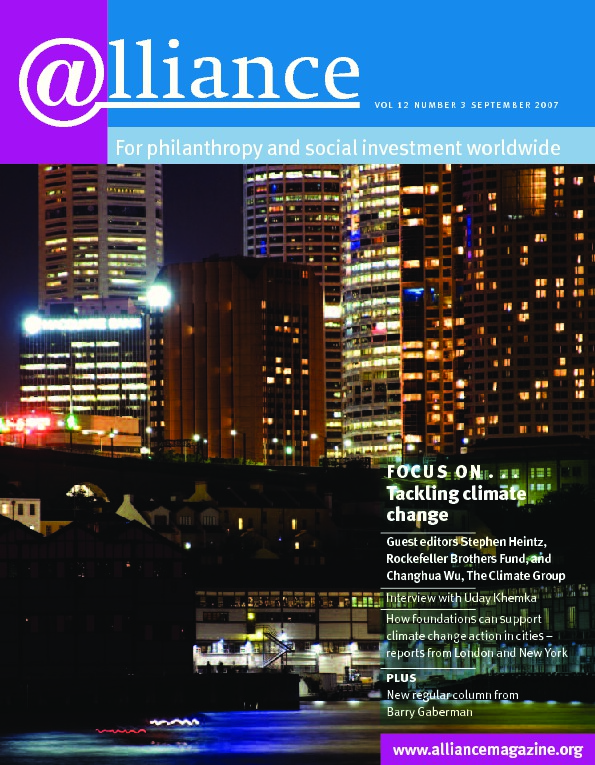Scientists and pressure groups seem finally to have won the argument: even among erstwhile deniers in the US, there’s a reluctant acceptance that climate change might not be just one more item on a long list of dubious causes, but rather the defining challenge for humanity in the 21st century.
Easily the equal of the great humanitarian and social challenges of the last century, a failure to address climate change will utterly undermine any social or economic progress we might hope to make. It’s the mother of all market failures, and unfortunately it presents itself at a time when market-based economics is the only game in town.
Clearly, then, the big trusts and foundations are going to put all hands to this pump. What is the point of micro-managing outcomes for disadvantaged groups here and there if the universal basis for survival is threatened? Moving deckchairs on the Titanic springs to mind.
But climate change, like other global sustainability challenges, does not seem to loom very large in the priorities of many foundations. It doesn’t really fit. A telling insight into the relationship between people, economics and nature, it can’t be framed as an environmental issue, since its causes are anything but environmental. Work to address it sits uneasily with conventional funding structures, and doesn’t readily deliver the kinds of outcomes that philanthropists old and new are increasingly focused on. In rising to the challenge of climate change, like other sustainability issues, foundations need to overhaul their thinking, their purpose and their structures.
Fortunately, there is a perfectly adequate theoretical framework in which to think about cross-cutting issues like climate change. Sustainable development has been around for 20 years at least, and a growing band of organizations use it as a practical means of simultaneously addressing social, economic and environmental issues.
I suggest that philanthropic organizations need urgently to follow suit, and update their worldview to take account of the challenge of global sustainability. Without this kind of joined-up approach, foundations run a number of risks. These include being marginalized by new philanthropists who have no legacy agenda to deal with and can move more quickly; and undermining their giving strategies by their own investment strategies.
But applying the principles of sustainable development also offers foundations the chance to radically improve their effectiveness by addressing the causes of disadvantage upstream rather than mopping up their social consequences.
The first step must be to update the mission and purpose of trusts to take climate change and other global sustainability challenges into account. These new priorities then need to be reflected in overhauled giving strategies, with a joined-up approach to environmental, social and economic issues. Climate change is now such an overwhelming priority that I would advocate a funding position that states ‘If this project doesn’t contribute to alleviating climate change, we won’t fund it’.
Investment strategies should then be aligned too. It’s relatively easy to find socially and environmentally responsible funds that compete well with ‘conventional’ (ie irresponsible) funds, so what could be the reason not to use them? This could be the greatest single lever foundations have in addressing their charitable purpose. At the very least they should feel confident that they are not raising money to address poverty in one country by means that create it in another.
With these ‘hygiene factors’ addressed, the next step would be to allocate significant chunks of funding to explicitly addressing both mitigation and adaptation strategies for climate change.
Ultimately, I think foundations should aggregate their efforts in a shared framework based in the principles of sustainable development. The Woburn Place Collaborative in the UK is an interesting experiment in joining up agendas in this way. Though it has yet to address the urgency of sustainability issues, the potential is there for a group of funding bodies to have a shared approach in which they map the challenge and then each make distinctive contributions, with much greater collective effect.
With these building blocks in place, I believe that a rejuvenated philanthropic sector could play a crucial leadership role in our collective response to climate change, seeding the vital work that will enable us to find a path to human progress.
Ben Tuxworth is Director of Communications, Forum for the Future. Email b.tuxworth@forumforthefuture.org.uk






Comments (0)